Like franchise quarterbacks, NBA superstars worth the wait
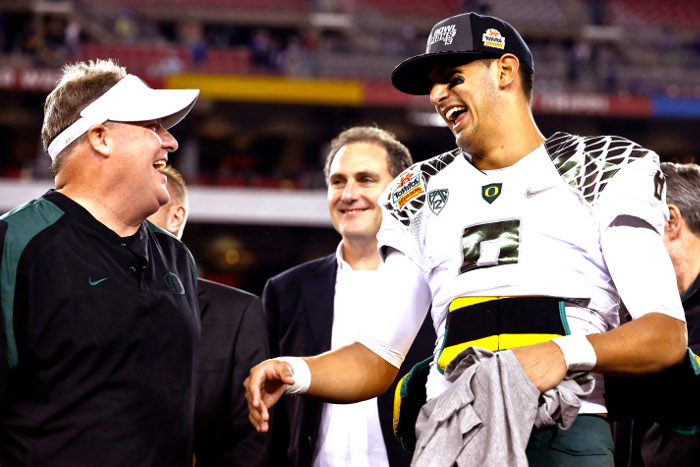
Watching last night’s NFL draft, the culmination of 4 months of Marcus Mariota fetishization from Philadelphia Eagles fans, was interesting.
According to a report from Ian Rapoport of the NFL Network, the Eagles were talking about a package of two 1st round picks, a 3rd rounder, and 3 young starters on the defensive side of the ball: Fletcher Cox, Brandon Boykin, and Mychal Kendricks.
The proposed deal was met with almost universal praise: #DoTheDeal flowed throughout twitter as Eagles fans showed their willingness to mortgage the short term future to get a guy they thought could be built around.
Whether or not the rumored deal was actually on the table is a topic of debate, but it’s a moot point in the current context. What I found interesting was the overwhelming support the trade received from football fans and the local media. I’m writing about fan acceptance, not reporting on the plausibility of the trade happening.
Not that such a trade, or at least the idea of such a trade, is without merit, of course. History has shown that franchise quarterbacks, while perhaps not absolutely necessary if you have an all-time great defense, provide an incredible advantage to those teams lucky enough to have one, and are incredibly difficult to obtain. The confluence of these two truths drive up their value, and makes otherwise insane trades rational.
The thing is, such a trade represented a huge risk as well. Gutting the defensive side of the ball while handing the ball over to a rookie quarterback, even one familiar with Chip Kelly’s system, would have likely resulted in a step back over the next year or two. The loss of draft picks — two 1st round picks and a 3rd round pick in the Mariota trade, and a 2nd round draft pick (2016) and a 4th round pick (2015) in the Bradford deal — would have made it difficult for the team to replenish the talent gap in the immediate future.
And, if Marcus Mariota ended up being who everybody hoped he would be, you could justify that incredible loss of talent. It’s the long game, after all, and if you’re talking about a 10+ year career of greatness, it’s a small price to pay.
But if Mariota wasn’t who we thought he was. It’s the type of move that can set a franchise back for half a decade. It’s as risky of a move as you can make in the NFL, and one that history has shown rarely works out. For every Andrew Luck or Donovan McNabb there are failures as well: from unmitigated disasters like Ryan Leaf and JaMarcus Russell, to injury disappointments like Sam Bradford, to just disappointing like Mark Sanchez. But the city embraced the risk of taking a QB in the top-5 because the reward was high enough.
There was risk. There was unknown.
(Related: why, when NFL teams screw up, do we pin the blame on the NFL teams rather than on the inherent risks in the draft? Why do we go “Man, the Raiders will be the Raiders”, or “Can you believe the Bengals hitched their future to Akili Smith?”, but in the NBA it’s “The Los Angeles Clippers extended period of irrelevance is proof that building through the draft doesn’t work. My column:” ?)
The same can be said about the NBA and superstar players. While no individual NBA position is head and shoulders more important than the others, like a quarterback is in football, getting a top-20 player in the league is a virtual prerequisite to being relevant.
And, since the NBA’s salary cap is geared towards allowing teams to collect multiple top-20 players, whereas NFL teams having two franchise quarterbacks is a rarity, and a rarity that is usually short-lived, one could argue that legitimate franchise-changing players in the NBA are just as difficult to get your hands on.
It’s also worth pointing out that, while the NFL is geared towards more parity and quick turnarounds, the NBA is built around dynasties. Upsets in the NFL playoffs happen, the low sample size and inherent randomness almost guarantee them. Get in the playoffs, and you have a chance. In the NBA that doesn’t happen: great teams stay great, “average” teams are borderline irrelevant, and moving up in the ladder is an incredibly difficult endeavor.
This just increases the need for real difference makers. Without them, you’re not really risking anything, and with them, the reward is tremendous.
Which makes much of the reaction to what the Sixers are doing odd to me. If we’re willing to embrace risk in trading the farm for Mariota, and willing to take a step back in terms of short-term competitiveness for long-term gains, why isn’t the same true for basketball? If the potential reward of an unknown outcome makes it a necessary risk to take in acquiring a franchise quarterback, why do we focus so intently on the unknown aspect of the Sixers plan?
Here’s the cold, hard truth: there is unknown in every rebuild, in every sport, for a team trying to achieve greatness.
It’s nights like last night with the Eagles why I sit here and look at some of the columns about the Michael Carter-Williams trade with absolute disbelief. When did we become so beholden to “known”, even if the known wasn’t good enough? When did we become so terrified of the unknown, so unwilling to accept risk, and, especially, in such denial about the risk present in every climb to the top?
When did we, as a Philadelphia fanbase, become so scared of losing mediocre? Growing up in this town in the 90’s and pre-2008 Phillies, all the town ever talked about was what they would do for a champion. Not NFL East champion, not NFC champion, but NFL champion. We live in a city that regularly derides Andy Reid, the winningest coach in Eagles history, for the game that he didn’t win.
Yet we sit here and worry about the “risk” in trading Michael Carter-Williams? Deride the unknown nature of the Lakers pick? We sit here worried about the “risk” in moving on from the team centered around Jrue Holiday and Thaddeus Young to one centered around Joel Embiid, Nerlens Noel, and <insert 2015 draft pick here>? All this just because the rewards aren’t immediate?
Why is willingly taking a step back in the NFL just part of the process, but in the NBA it’s a moral affront to everything sacred about sports? The timeframe is the same and the objective is similar, but one is accepted and the other criticized?
Progress is not linear, and it is not without risk. That’s not unique to basketball, or to the NBA draft.
Which brings me to my second point: Joel Embiid is a better NBA prospect than Marcus Mariota is an NFL one, and superstars in the NBA have a similar impact as franchise quarterbacks do the NFL.
So why the lack of excitement? And does that tie into fans acceptance of risk in the NFL draft, but not the NBA?
The popularity of college football, and the familiarity most fans have with that, is likely a big reason.
Besides the fact that many more NFL fans watch college football than NBA fans watch college basketball, the NFL draft benefits by being littered with developed, experienced players, whereas in the NBA draft even the best prospects frequently only dominate some of the time in college. Even NBA studs like Anthony Davis and Russell Westbrook flashed brilliance in college more than they dominated.
That doesn’t make the NBA draft riskier, but it does change our perception of risk. Familiarity breeds acceptance.
But our lack of familiarity doesn’t make a move, or a strategy, right or wrong, and the difference between risk and unfamiliar drives the narrative far too much.


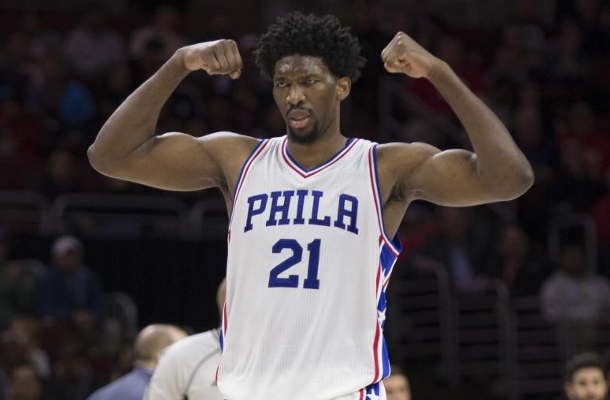
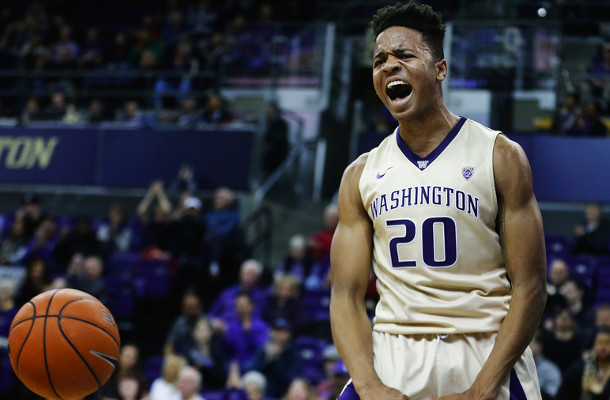
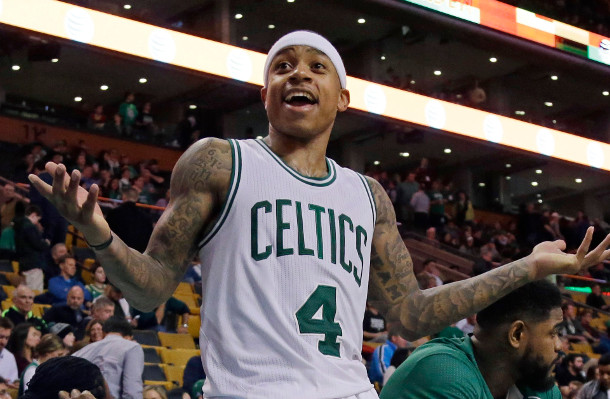
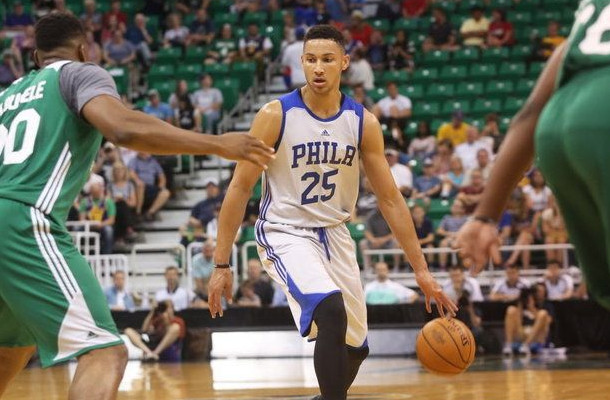
Pingback: generic albuterol inhaler()